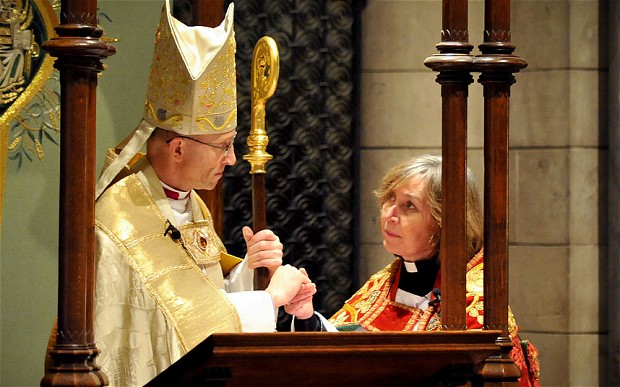
Women’s Group Challenges Gender Identity of God, Uses both “he” and “she” pronouns
- By Alison Lesley --
- 15 Jun 2015 --

A women’s group in England is encouraging people to think about God in a broader sense, as an all-knowing being without gender.
The Church of England group, Women and the Church or WATCH, recently campaigned, and succeeded, in ordaining female bishops. With two female bishops recently ordained, they have noticed an issue with referring to God exclusively with male pronouns, saying that God is greater than male or female. Though opponents refer to them as “lunatics,” they rarely bring up a valid argument against their desires, preferring to simply brush the matter to the side. However, the women of WATCH feel that the use of male language can deter women from feeling they are as holy as men are.
She, He, Why Do They Care?
Some argue that it doesn’t even matter what they call God, as he is simply an all-knowing being. However, the problem falls to the way service is presented to followers and believers. Many priests, including Rev. Kate Bottley (St. Mary and St. Martin’s vicar in Nottinghamshire), have begun to drop ‘He’ and ‘Him’ when they talk about God, and others have used both ‘she’ and ‘he’ intermittently.
The chairperson for the WATCH group, Hilary Cotton, has said that the discussion has already been taking place, and will continue to be wrestled over “for a number of years.” She adds that the prime reason it is being brought up now is “because of a change in gender culture.” The group has stated that the prime goal by altering the language of the Church and doctrine is in “broadening our understanding of God” and that by continuing “to address our worship to an almost exclusively male God, then we are failing God.”
WATCH is given a meeting space at the Lambeth Palace, and they have discussions with the Transformations Steering Group, which is an independent group that consists of female clergy members “exploring issues relating to the reception of women in ministry.”
According to certain songs, Jesus and God are referred to in female language. For example, Canticle 86 calls God the ‘mother in all things’ and Jesus is spoken of like a mother in Canticle 82. Cotton says that this indicates the chance that the Church isn’t set against women, and that all genders are made in “the image of God”, which should make it “entirely appropriate to express our worship toward God as a female presence.” Rev. Jody Stowell, another WATCH member, says that, according to orthodox theology, “all human beings are made in the image of God, that God does not have a gender.” The primary aim is for inclusive language that doesn’t make women feel less holy than men are.



















